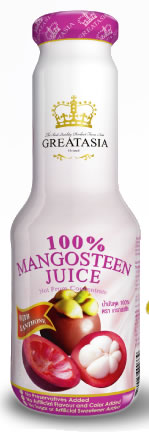1. Breast Cancer
The researcher found Mangosteen extract powder has strong inhibited the growth of breast cancer cells, potent antioxidant and has potential for cancer chemoprevention.
2. Leukemia
The researcher examined the effects of six xanthones from mangosteen pericarp, on the cell growth inhibition of human leukemia cell line HL60. All xanthones displayed growth inhibitory effects. Among them, alpha-mangostin showed complete inhibition.
3. Mycobacterium Tuberculosis
The researcher found alpha- and beta-mangostins and garcinone B from mangosteen extract exhibited strong inhibitory effect against Mycobacterium tuberculosis (TB).
4. Liver ,gastric ,and lung cancer
The researcher extracted purified 6 xanthone compounds from the mangosteen rinds (peel)and tested on 14 different human cancer cell lines. The results have shown that one of the xanthone derivatives which could be identified as garcinone E has potent cytotoxic effect (kill cells) on all liver cancer cell lines as well as on the other gastric and lung cancer cell lines.
5. Allergies
Mangosteen extract powder has potent inhibitory activities of both histamine release and prostaglandin E2 synthesis. This has importance role in preventing allergies.
6. Reduce Pain & Inflammation
Researchers studied the effect of gamma-mangostin, a xanthone contained in the mangosteen fruit. They found that it can reduced inflammation results (reduced pain).
The researchers tested 18 xanthone derived compounds found in the mangosteen fruit and found that some of these compounds possessed strong anti-inflammatory properties.
7. Anti Bacteria
Researchers studied Polysaccharides that were extracted from the dried ground pericarp of mangosteen fruit. The results show that polysaccharides in the extract can stimulate phagocytic cells to kill intracellular bacteria (S. enteritidis).
Researchers found that the extracts of Garcinia mangostana shown inhibitory effects against the growth of Staphylococcus aureus.
8. Reduce LDL Cholesterol
Oxidative damage is thought to play a critical role in cardiovascular (involving the heart and blood vessels) and other chronic diseases. This has led to considerable interest in the antioxidant activity of dietary compounds. However, little is known about the antioxidant activity of other plant derived phenolic compounds such as the xanthones. We have previously shown that the prenylated xanthone, mangostin, can inhibit the oxidation of low density lipoprotein. Researchers studied more
xanthone derived compounds and the results of this study show that structural modification of mangostin can have a profound effect on antioxidant activity.
The oxidation of low density lipoprotein (LDL) may play an important role in atherosclerosis. We investigated the possible antioxidant effects of mangostin, isolated from Garcinia mangostana. The results, the researchers conclude that mangostin is acting as a free radical scavenger to protect the LDL from oxidative damage in this in vitro system.
9. Anti –Cancer
The researchers investigated the cell death effects of eight xanthones on cancer cells. Among these compounds, alpha-mangostin, from the fruit hull of mangosteen had the most potent ability to cause the cancer cells death.
10. Prevent Heart Disease & Blood Pressure
The researchers studied a series of xanthones and related compounds. All the compounds tested exhibited effective hypotensive (lower blood pressure) activity in anesthetized rats.
11. Blood Sugar Levels prevention
Mangiferin (MF),xanthone, was tested for antidiabetic activity in mice, an animal model of type-2 diabetes., it seems likely that MF exerts its antidiabetic activity by decreasing insulin resistance.
12. Blood Clotting
Mangosteen extract powder has potent inhibit on thromboxane formation (antithrombotic or anti clotting)
13. Anti convulsant
Researchers studied compounds of xanthone derivatives. They found several xanthones were found to be active in anticonvulsant tests.
14. Anti Malaria
The researcher showed the antimalarial potency of xanthones studied
15. Skin condition
Mangosteen has been used as a Thai indigenous medicine for many years to solve the skin problems such as problem of inflammation like eczema and dermatitis infection, wound, acne , sun damage.
16. Immune system
Mangosteen can support and boost immune system and help our bodies healthy and strong.
17. Nervous system
Mangosteen can effect the prevention and treatment of Parkinson and Alzheimer by decreasing oxidative damage and inflammation. |
Reference:
Garcinone E, a xanthone derivative, has potent cytotoxic effect against the patocellular carcinoma cell lines. Planta Med. 2002 Nov;68(11):975-9. Ho CK, Huang YL, Chen CC. Department of Medical Research & Education, Veterans General Hospital, Taipei, ROC.
Inhibitions of histamine release and prostaglandin E2 synthesis by mangosteen, a Thai medicinal plant. Biol Pharm Bull. 2002 Sep;25(9):1137-41. Nakatani K, Atsumi M, Arakawa T, Oosawa K, Shimura S, Nakahata N, Ohizumi Y. Department of Pharmaceutical Molecular Biology, Graduate School of Pharmaceutical Sciences, Tohoku University, Sendai, Japan.
Synthesis and anti-inflammatory effects of xanthone derivatives. J Pharm
Pharmacol. 1996 May;48(5):532-8. Lin CN, Chung MI, Liou SJ, Lee TH, Wang JP. School of Pharmacy, Kaohsiung Medical College, Taiwan, R.O.C.
Immunopharmacological activity of polysaccharide from the pericarp of mangosteen garcinia: phagocytic intracellular killing activities. J Med Assoc Thai. 1997 Sep;80 Suppl 1:S149-54. Chanarat P, Chanarat N, Fujihara M, Nagumo T. Department of Clinical Microscopy, Faculty of Associated Medical Sciences, Chiang Mai University, Thailand.
Inhibition of lipoprotein oxidation by prenylated xanthones derived from mangostin. Free Radic Res. 2000 Nov;33(5):643-59. Mahabusarakam W, Proudfoot J, Taylor W, Croft K. Chemistry Department, Prince of Songkla University, Hat Yai, Thailand.
Mangostin inhibits the oxidative modification of human low density lipoprotein. Free Radic Res. 1995 Aug;23(2):175-84. Williams P, Ongsakul M, Proudfoot J, Croft K, Beilin L. University of Western Australia, Department of Medicine, Royal Perth Hospital, Australia.
Plant-derived leading compounds for chemotherapy of human immunodeficiency virus (HIV) infection. Planta Med. 1998 Mar;64(2):97-109. Vlietinck AJ, De Bruyne T, Apers S, Pieters LA. Department of Pharmaceutical Sciences, University of Antwerp (UA), Belgium. vlietink@uta.ua.ac.be
Active constituents against HIV-1 protease from Garcinia mangostana. Planta
Med. 1996 Aug;62(4):381-2. Chen SX, Wan M, Loh BN.
Antidiabetic activity of a xanthone compound, mangiferin. Phytomedicine.
2001 Mar;8(2):85-7. Miura T, Ichiki H, Hashimoto I, Iwamoto N, Kato M, Kubo M, Ishihara E, Komatsu Y, Okada M, Ishida T, Tanigawa K. Suzuka University of Medical Science, Mie, Japan.
Synthesis and antithrombotic effect of xanthone derivatives. J Pharm
Pharmacol. 1996 Sep;48(9):887-90. Lin CN, Hsieh HK, Liou SJ, Ko HH, Lin HC, Chung MI, Ko FN, Liu HW, Teng CM. School of Pharmacy, Department of Internal Medicine, Kaohsiung Medical College, Taiwan, R.O.C.
Synthesis and anticonvulsant effects of some aminoalkanolic derivatives of
xanthone. Pharmazie. 1998 Oct;53(10):672-6. Marona H. Department of Chemical Technology of Drugs, Collegium Medicum, Jagiellonian University, Krakow, Poland.
Xanthones as antimalarial agents; studies of a possible mode of action. FEBS
Lett. 1997 Jun 2;409(1):67-73. Ignatushchenko MV, Winter RW, Bachinger HP, Hinrichs DJ, Riscoe MK. Department of Biochemistry and Molecular Biology, Oregon Health Sciences University, Portland 97201, USA.
Alpha-mangostin induces Ca(2+)-ATPase-dependent apoptosis via mitochondrial pathway in PC12 cells. J Pharmacol Sci. 2004 May;95(1):33-40. Sato A, Fujiwara H, Oku H, Ishiguro K, Ohizumi Y. Department of Pharmaceutical Molecular Biology, Graduate School of Pharmaceutical Sciences, Tohoku University, Sendai, Japan.
Antihypertensive and vasorelaxing activities of synthetic xanthone derivatives. Bioorg Med Chem. 2002 Mar;10(3):567-72. Wang LW, Kang JJ, Chen IJ, Teng CM, Lin CN. School of Pharmacy, Kaohsiung Medical University, Kaohsiung, Taiwan 807, ROC.
|














